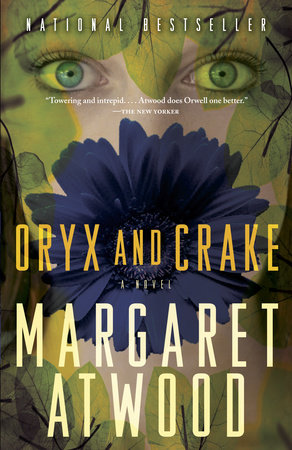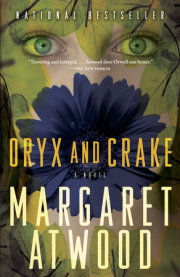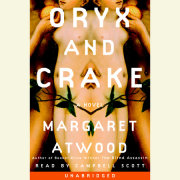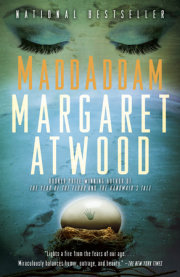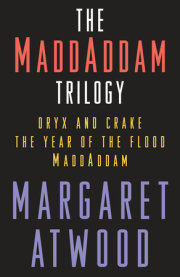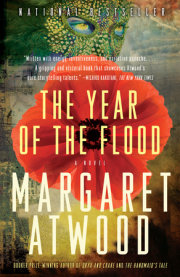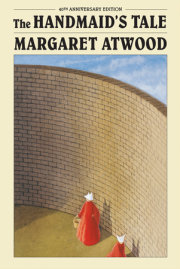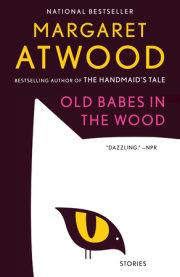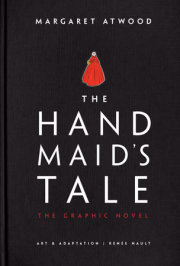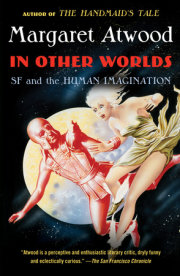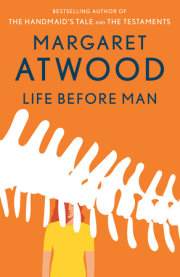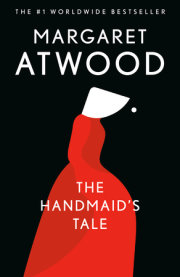1 Mango Snowman wakes before dawn. He lies unmoving, listening to the tide coming in, wave after wave sloshing over the various barricades, wish-wash, wish-wash, the rhythm of heartbeat. He would so like to believe he is still asleep.
On the eastern horizon there's a greyish haze, lit now with a rosy, deadly glow. Strange how that colour still seems tender. The offshore towers stand out in dark silhouette against it, rising improbably out of the pink and pale blue of the lagoon. The shrieks of the birds that nest out there and the distant ocean grinding against the ersatz reefs of rusted car parts and jumbled bricks and assorted rubble sound almost like holiday traffic.
Out of habit he looks at his watch - stainless-steel case, burnished aluminum band, still shiny although it no longer works. He wears it now as his only talisman. A blank face is what it shows him: zero hour. It causes a jolt of terror to run through him, this absence of official time. Nobody nowhere knows what time it is.
"Calm down," he tells himself. He takes a few deep breaths, then scratches his bug bites, around but not on the itchiest places, taking care not to knock off any scabs: blood poisoning is the last thing he needs. Then he scans the ground below for wildlife: all quiet, no scales and tails. Left hand, right foot, right hand, left foot, he makes his way down from the tree. After brushing off the twigs and bark, he winds his dirty bedsheet around himself like a toga. He's hung his authentic-replica Red Sox baseball cap on a branch overnight for safekeeping; he checks inside it, flicks out a spider, puts it on.
He walks a couple of yards to the left, pisses into the bushes. "Heads up," he says to the grasshoppers that whir away at the impact. Then he goes to the other side of the tree, well away from his customary urinal, and rummages around in the cache he's improvised from a few slabs of concrete, lining it with wire mesh to keep out the rats and mice. He's stashed some mangoes there, knotted in a plastic bag, and a can of Sveltana No-Meat Cocktail Sausages, and a precious half-bottle of Scotch - no, more like a third - and a chocolate-flavoured energy bar scrounged from a trailer park, limp and sticky inside its foil. He can't bring himself to eat it yet: it might be the last one he'll ever find. He keeps a can opener there too, and for no particular reason an ice pick; and six empty beer bottles, for sentimental reasons and for storing fresh water. Also his sunglasses; he puts them on. One lens is missing but they're better than nothing.
He undoes the plastic bag: there's only a single mango left. Funny, he remembered more. The ants have got in, even though he tied the bag as tightly as he could. Already they're running up his arms, the black kind and the vicious little yellow kind. Surprising what a sharp sting they can give, especially the yellow ones. He rubs them away.
"It is the strict adherence to daily routine that tends towards the maintenance of good morale and the preservation of sanity," he says out loud. He has the feeling he's quoting from a book, some obsolete, ponderous directive written in aid of European colonials running plantations of one kind or another. He can't recall ever having read such a thing, but that means nothing. There are a lot of blank spaces in his stub of a brain, where memory used to be. Rubber plantations, coffee plantations, jute plantations. (What was jute?) They would have been told to wear solar topis, dress for dinner, refrain from raping the natives. It wouldn't have said
raping. Refrain from fraternizing with the female inhabitants. Or, put some other way . . .
He bets they didn't refrain, though. Nine times out of ten.
"In view of the mitigating," he says. He finds himself standing with his mouth open, trying to remember the rest of the sentence. He sits down on the ground and begins to eat the mango.
Flotsam On the white beach, ground-up coral and broken bones, a group of the children are walking. They must have been swimming, they're still wet and glistening. They should be more careful: who knows what may infest the lagoon? But they're unwary; unlike Snowman, who won't dip a toe in there even at night, when the sun can't get at him. Revision: especially at night.
He watches them with envy, or is it nostalgia? It can't be that: he never swam in the sea as a child, never ran around on a beach without any clothes on. The children scan the terrain, stoop, pick up flotsam; then they deliberate among themselves, keeping some items, discarding others; their treasures go into a torn sack. Sooner or later - he can count on it - they'll seek him out where he sits wrapped in his decaying sheet, hugging his shins and sucking on his mango, in under the shade of the trees because of the punishing sun. For the children - thick-skinned, resistant to ultraviolet - he's a creature of dimness, of the dusk.
Here they come now. "Snowman, oh Snowman," they chant in their singsong way. They never stand too close to him. Is that from respect, as he'd like to think, or because he stinks?
(He does stink, he knows that well enough. He's rank, he's gamy, he reeks like a walrus - oily, salty, fishy - not that he's ever smelled such a beast. But he's seen pictures.)
Opening up their sack, the children chorus, "Oh Snowman, what have we found?" They lift out the objects, hold them up as if offering them for sale: a hubcap, a piano key, a chunk of pale-green pop bottle smoothed by the ocean. A plastic BlyssPluss container, empty; a ChickieNobs Bucket O'Nubbins, ditto. A computer mouse, or the busted remains of one, with a long wiry tail.
Snowman feels like weeping. What can he tell them? There's no way of explaining to them what these curious items are, or were. But surely they've guessed what he'll say, because it's always the same.
"These are things from before." He keeps his voice kindly but remote. A cross between pedagogue, soothsayer, and benevolent uncle - that should be his tone.
"Will they hurt us?" Sometimes they find tins of motor oil, caustic solvents, plastic bottles of bleach. Booby traps from the past. He's considered to be an expert on potential accidents: scalding liquids, sickening fumes, poison dust. Pain of odd kinds.
"These, no," he says. "These are safe." At this they lose interest, let the sack dangle. But they don't go away: they stand, they stare. Their beachcombing is an excuse. Mostly they want to look at him, because he's so unlike them. Every so often they ask him to take off his sunglasses and put them on again: they want to see whether he has two eyes really, or three.
"Snowman, oh Snowman," they're singing, less to him than to one another. To them his name is just two syllables. They don't know what a snowman is, they've never seen snow.
It was one of Crake's rules that no name could be chosen for which a physical equivalent - even stuffed, even skeletal - could not be demonstrated. No unicorns, no griffins, no manticores or basilisks. But those rules no longer apply, and it's given Snowman a bitter pleasure to adopt this dubious label. The Abominable Snowman - existing and not existing, flickering at the edges of blizzards, apelike man or manlike ape, stealthy, elusive, known only through rumours and through its backward-pointing footprints. Mountain tribes were said to have chased it down and killed it when they had the chance. They were said to have boiled it, roasted it, held special feasts; all the more exciting, he supposes, for bordering on cannibalism.
For present purposes he's shortened the name. He's only Snowman. He's kept the
abominable to himself, his own secret hair shirt.
After a few moments of hesitation the children squat down in a half-circle, boys and girls together. A couple of the younger ones are still munching on their breakfasts, the green juice running down their chins. It's discouraging how grubby everyone gets without mirrors. Still, they're amazingly attractive, these children - each one naked, each one perfect, each one a different skin colour - chocolate, rose, tea, butter, cream, honey - but each with green eyes. Crake's aesthetic.
They're gazing at Snowman expectantly. They must be hoping he'll talk to them, but he isn't in the mood for it today. At the very most he might let them see his sunglasses, up close, or his shiny, dysfunctional watch, or his baseball cap. They like the cap, but don't understand his need for such a thing - removable hair that isn't hair - and he hasn't yet invented a fiction for it.
They're quiet for a bit, staring, ruminating, but then the oldest one starts up. "Oh Snowman, please tell us - what is that moss growing out of your face?" The others chime in. "Please tell us, please tell us!" No nudging, no giggling: the question is serious.
"Feathers," he says.
They ask this question at least once a week. He gives the same answer. Even over such a short time - two months, three? He's lost count - they've accumulated a stock of lore, of conjecture about him:
Snowman was once a bird but he's forgotten how to fly and the rest of his feathers fell out, and so he is cold and he needs a second skin, and he has to wrap himself up. No: he's cold because he eats fish, and fish are cold. No: he wraps himself up because he's missing his man thing, and he doesn't want us to see. That's why he won't go swimming. Snowman has wrinkles because he once lived underwater and it wrinkled up his skin. Snowman is sad because the others like him flew away over the sea, and now he is all alone. "I want feathers too," says the youngest. A vain hope: no beards on the men, among the Children of Crake. Crake himself had found beards irrational; also he'd been irritated by the task of shaving, so he'd abolished the need for it. Though not of course for Snowman: too late for him.
Now they all begin at once. "Oh Snowman, oh Snowman, can we have feathers too, please?"
"No," he says.
"Why not, why not?" sing the two smallest ones.
"Just a minute, I'll ask Crake." He holds his watch up to the sky, turns it around on his wrist, then puts it to his ear as if listening to it. They follow each motion, enthralled. "No," he says.
"Crake says you can't. No feathers for you. Now piss off."
"Piss off? Piss off?" They look at one another, then at him. He's made a mistake, he's said a new thing, one that's impossible to explain. Piss isn't something they'd find insulting. "What is
piss off?"
"Go away!" He flaps his sheet at them and they scatter, running along the beach. They're still not sure whether to be afraid of him, or how afraid. He hasn't been known to harm a child, but his nature is not fully understood. There's no telling what he might do.
Voice "Now I'm alone," he says out loud. "All, all alone. Alone on a wide, wide sea." One more scrap from the burning scrapbook in his head.
Revision: seashore.
He feels the need to hear a human voice - a fully human voice, like his own. Sometimes he laughs like a hyena or roars like a lion - his idea of a hyena, his idea of a lion. He used to watch old DVDs of such creatures when he was a child: those animal-behaviour programs featuring copulation and growling and innards, and mothers licking their young. Why had he found them so reassuring?
Or he grunts and squeals like a pigoon, or howls like a wolvog:
Aroo! Aroo! Sometimes in the dusk he runs up and down on the sand, flinging stones at the ocean and screaming,
Shit, shit, shit, shit, shit! He feels better afterwards.
He stands up and raises his arms to stretch, and his sheet falls off. He looks down at his body with dismay: the grimy, bug-bitten skin, the salt-and-pepper tufts of hair, the thickening yellow toenails. Naked as the day he was born, not that he can remember a thing about that. So many crucial events take place behind people's backs, when they aren't in a position to watch: birth and death, for instance. And the temporary oblivion of sex.
"Don't even think about it," he tells himself. Sex is like drink, it's bad to start brooding about it too early in the day.
He used to take good care of himself; he used to run, work out at the gym. Now he can see his own ribs: he's wasting away. Not enough animal protein. A woman's voice says caressingly in his ear,
Nice buns! It isn't Oryx, it's some other woman. Oryx is no longer very talkative.
"Say anything," he implores her. She can hear him, he needs to believe that, but she's giving him the silent treatment. "What can I do?" he asks her. "You know I . . ."
Oh, nice abs! comes the whisper, interrupting him.
Honey, just lie back. Who is it? Some tart he once bought. Revision, professional sex-skills expert. A trapeze artist, rubber spine, spangles glued onto her like the scales of a fish. He hates these echoes. Saints used to hear them, crazed lice-infested hermits in their caves and deserts. Pretty soon he'll be seeing beautiful demons, beckoning to him, licking their lips, with red-hot nipples and flickering pink tongues. Mermaids will rise from the waves, out there beyond the crumbling towers, and he'll hear their lovely singing and swim out to them and be eaten by sharks. Creatures with the heads and breasts of women and the talons of eagles will swoop down on him, and he'll open his arms to them, and that will be the end. Brainfrizz.
Or worse, some girl he knows, or knew, will come walking towards him through the trees, and she'll be happy to see him but she'll be made of air. He'd welcome even that, for the company.
He scans the horizon, using his one sunglassed eye: nothing. The sea is hot metal, the sky a bleached blue, except for the hole burnt in it by the sun. Everything is so empty. Water, sand, sky, trees, fragments of past time. Nobody to hear him.
"Crake!" he yells. "Asshole! Shit-for-brains!"
He listens. The salt water is running down his face again. He never knows when that will happen and he can never stop it. His breath is coming in gasps, as if a giant hand is clenching around his chest - clench, release, clench. Senseless panic.
"You did this!" he screams at the ocean.
No answer, which isn't surprising. Only the waves, wish-wash, wish-wash. He wipes his fist across his face, across the grime and tears and snot and the derelict's whiskers and sticky mango juice. "Snowman, Snowman," he says. "Get a life."
Copyright © 2003 by O.W. Toad Ltd.. All rights reserved. No part of this excerpt may be reproduced or reprinted without permission in writing from the publisher.

